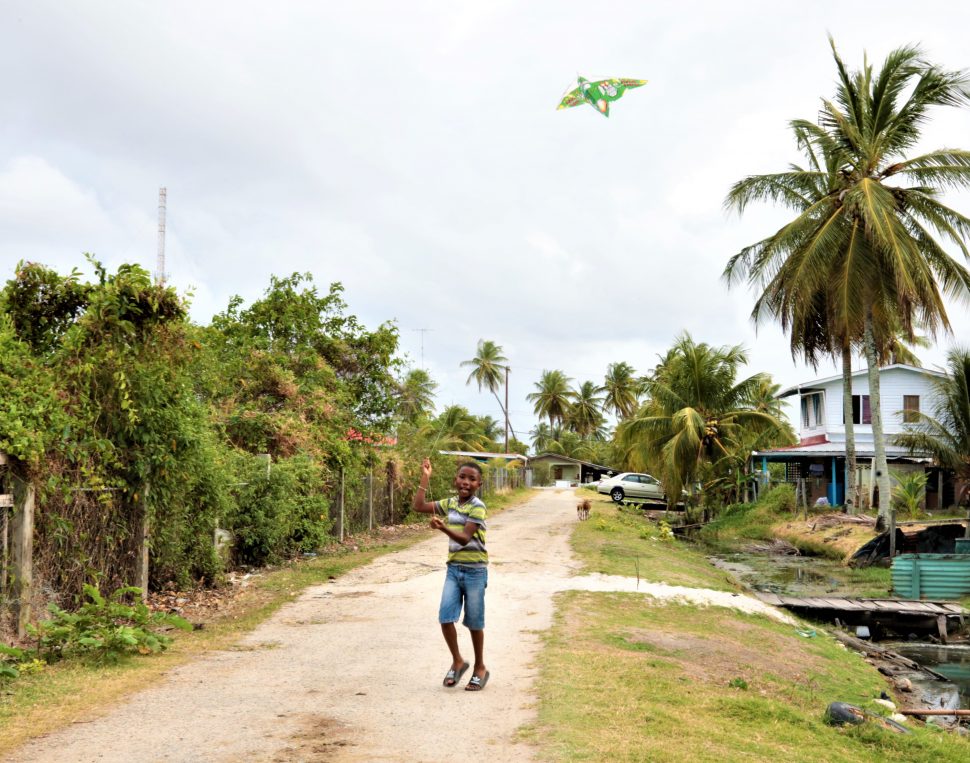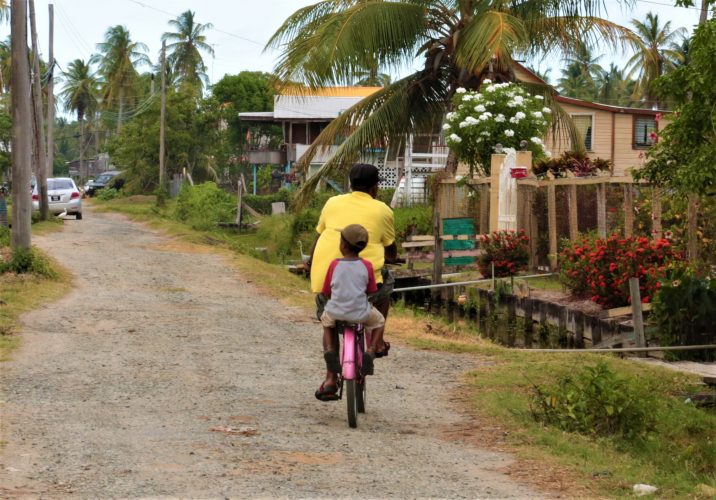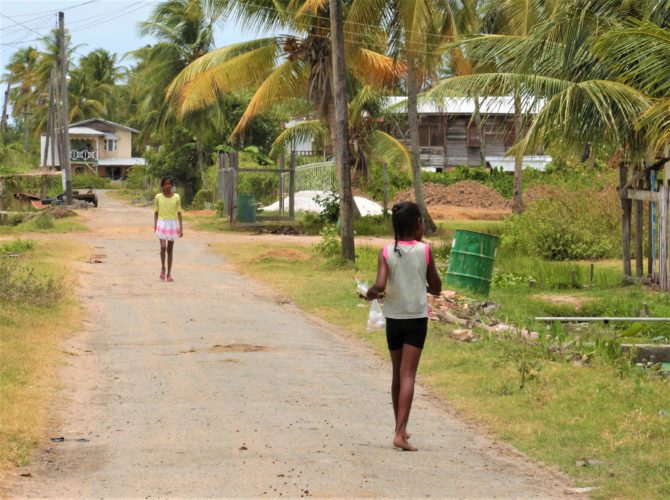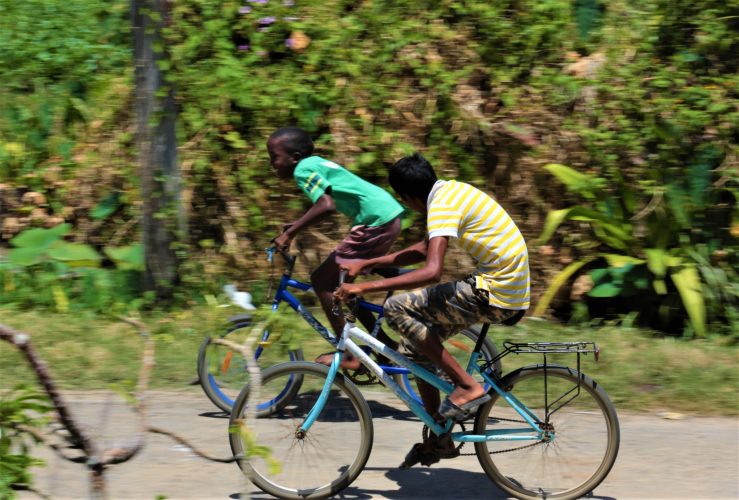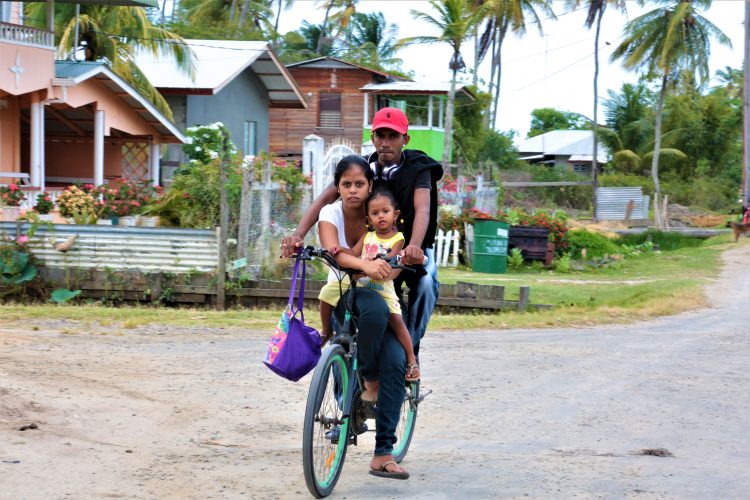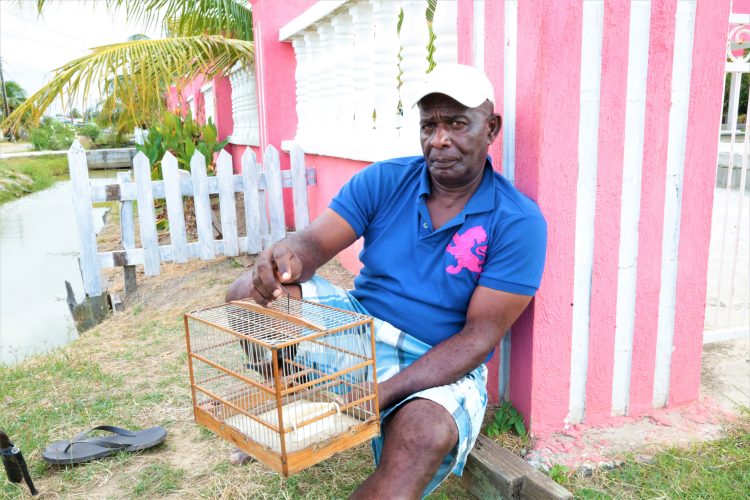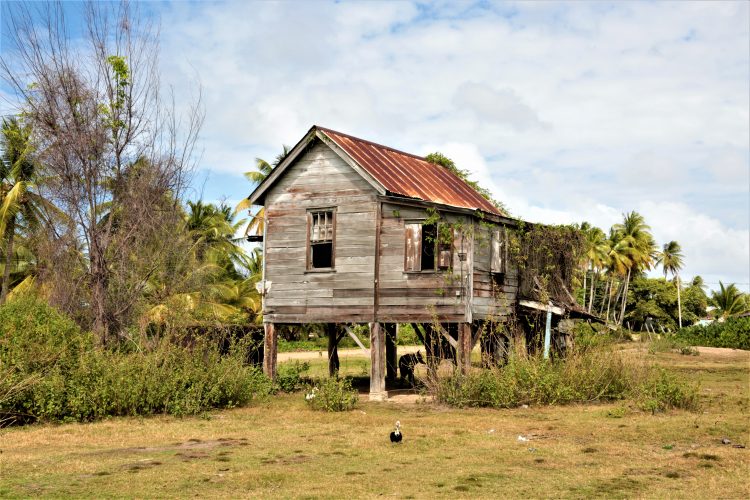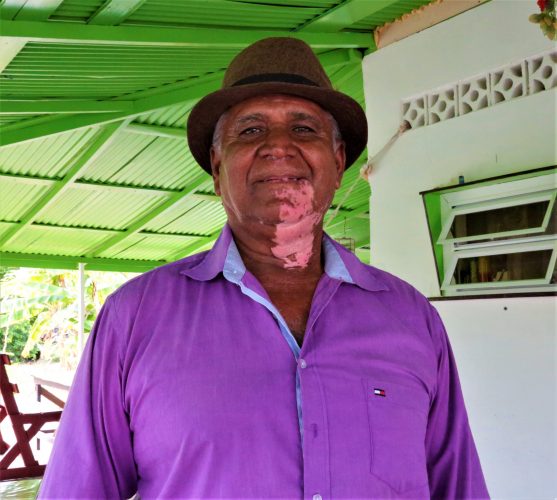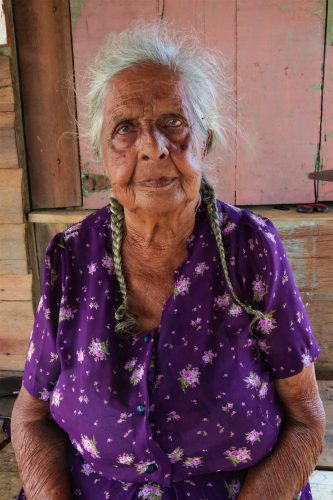Photos by Joanna Dhanraj
Thirty-eight kilometres from the city, sitting between Good Hope and Jonestown in Mahaica is the community of Hand-en-Veldt, home to almost 300 residents.
It is not surprising that the village’s Dutch name translates literally to ‘Hand and Field’, because its main economic activity is farming. It is said that almost every man in the village has a job and cannot be found at home after six in the morning. However, on Sundays and holidays, one would find them indulging in a bit of relaxation at home or having a drink with friends at a liquor restaurant. The women keep house or tend their kitchen gardens; a few accompany their husbands into the backdam. The younger folk prefer to be occupied with driving or working at private and government firms in Mahaica or in the city. It is rare to find youths taking up agriculture.
During my visit children were taking advantage of the weekend, making and flying their kites or playing cricket. Some were running errands. At one home, a couple sat in the yard looking out and the elderly woman was telling a child she did not have the fruit the child was requesting. Her name is Doolarie Shiv.
Shiv was born at Rosignol. A few years after her birth, her family moved to Beterverwagting. During the disturbances in the 60s, the family relocated to Mon Repos where she spent most of her teenage years until she got married and returned to live in Berbice. It was there that she was involved in an accident.
She was just getting off the Torani—the ferry plying the Rosignol/New Amsterdam route—when a truck, also making its way off the boat, slid off the gangway. She recalled pushing her 16-year-old daughter and a woman out of the way before being pinned by the truck. “When I got to the hospital, I keep telling the doctors to look after my baby and they looking for a baby not realising it’s a 16-year-old girl,” she related. “She had gotten bruise up. I had some head injuries and they say I was in a coma for 16 days. The doctor said to me after he don’t know how I come out from that. My mother used to say that when I had the coma and she used to come to visit me, she used to stand up on the step and look from there to see if I’m still on the bed wondering if I made it through the night. I was hospitalised for one year. I spent 6 months in New Amsterdam and then they transferred me to Georgetown where I spent 6 more months.”
According to the woman, after she left the hospital, she decided to raise her six children on her own not having the necessary support from their father. Using a pair of crutches, she returned to work at the Bourda Market. The woman shared that she had steel in one of her legs, but owing to overworking, she had to return often to her doctor to fix it. Eventually, she lost the leg. She has since been fitted with a prosthetic.
Today, Shiv still sells. She vends at the Annandale Market. The woman noted that she sells ground provision, fruits and vegetables, some from what she plants and the remainder she purchases at one of the markets in Georgetown.
Her husband sat nearby listening. Asked whether he helps out on the farm, Shiv said he had suffered a stroke and therefore she pays someone to assist her.
Shiv moved to Hand-en-Veldt after she remarried. “Here’s more quiet than Mon Repos. Everybody here is working. Most persons work on their farm. For the ladies that go to the backdam you would find them stripping broom. The youngsters them would go to work in town. Living here you feel safe, but we don’t leave we door open like long time back when we used to,” she noted.
Eighty-five-year-old Lena Biraspath was relaxing in her hammock when I showed up. She hails from Cane Grove, Mahaica. Her mother passed on when she was 12 years old and she and her other siblings were raised by their eldest sister. When she was 15, Biraspath got married and moved to Hand-en-Veldt. She noted that the village was not “as bright” as Cane Grove, but she has come to love its quiet atmosphere.
“After I come here, we [she and her husband] used to do copra work, dry coconut and sell fry oil. The first house was a bush house before we build this one here. I used to daub the walls of the first house once in a while then paste newspapers on the walls,” she said.
The woman recalled fetching water from the irrigation canal which they used for all their purposes. There was a rule against persons bathing in the canal. Anyone not adhering to the rule would be charged a fine. However, Biraspath can’t ever remember this being an issue as everyone did as was expected of them.
Born into a Muslim family, Biraspath converted to Hinduism after marrying her husband. She said that when her husband was alive, she held jhandis (Hindu religious services). After he died, she stopped following through with the Hindu functions, but would assist her Hindu neighbours with preparations when they have their functions. “We live nice here. Anybody sick, we would check on one another. We don’t get problem with nobody here,” she said.
Dowlat Bridgemohan was having a late lunch. Everyone in the community calls him ‘Uncle Grey Beard’. He spent most of his life in Hand-en-Veldt except for a few months when he lived in Venezuela back in the 1980s. The village, the man noted, has five streets aside from its other cross streets.
Bridgemohan said that the village is relatively peaceful. However, there are a few domestic disputes from time to time. Almost a decade back, there was a murder in the village and just a month ago, in an incident of domestic violence, a woman suffered at the hands of her husband. However, her life was spared. “There is a difference with the young people today than the ones from long ago,” Bridgemohan said. “Today they don’t have much respect for women like before and some of them have taken up smoking dope.”
Growing up, the man attended Helena Primary School. He was raised by his grandparents and began accompanying them to the backdam by the time he was nine. He stuck with farming and today at 66 years old, still works his own rice field. “The land is there, you can’t just left it down like that. Is only now me working with people since I join the NDC and we does work four hours a day,” he said.
For security purposes, this resident preferred to use a nickname he was given when he was a boy. ‘Bowfoot’ sat in a wooden chair on his verandah while he tuned into one of his favourite shows. He looked out to the road when I passed by and with a smile on his face enquired about my visit to his village.
Bowfoot was a young man when he purchased a plot of land in Hand-en-Veldt and began building his own house. He has remained there since. His career would have seen him employed with the Army and also with Customs at the Cheddi Jagan International Airport.
“The people here are very friendly and very hardworking. They assist each other. At six o’ clock in the morning all the males would have left for work in the backdam. About three-quarter of Hand-en-Veldt do farming,” the man said.
“If you want to live in the countryside come here. Mahaica has all you can think about. We have a lot of produce going to the market down to plastic bags with nuts. You don’t really buy greens here. Sometimes you go to the market and they just tell you to take it and go.”
Asking about the work he does now, Bowfoot went on to explain that owing to an injury, he was somewhat confined to his chair or to the house more so, though he still manages to drive. “I was involved in a car accident in 2009. At the time I was not the one driving. My relief driver was driving, and I was seated behind him. It was a Sunday afternoon and we had finish working at Timehri at 3 o’clock and were heading to Georgetown to continue our work. About ten minutes after leaving we got into an accident somewhere around Bounty Farm. The driver was trying to overtake a vehicle while another vehicle was trying to overtake him, and he tipped on the brakes and the vehicle started toppling. During the accident I was sent flying out of the vehicle. The driver got a broken arm in two places while the other occupants got bruises to themselves. The speed I was going at forced me into a concrete drain smaller than the width of my shoulder. I couldn’t move to get out and the people who were running to our rescue didn’t realize there was a fourth passenger because they weren’t finding me. Eventually they found me and took me out and I walk about 25 feet and that’s when I began feeling a pain on the left side of my back. At the time I had a licensed firearm on me, so I gave one of my colleagues to hand it in and was taken to Diamond Hospital and was referred to Georgetown Hospital….”
Bowfoot fell into a coma and remained that way for three days. An MRI showed that he sustained a broken neck. For 11 days, weights were placed on his head while his feet were tied to the end of the bed to bring the bones back together. He was expected to die and after 17 days, was sent home to spend his last days. He survived but spent the next three years paralyzed in bed; he could barely talk. He spent an additional two years, ten months at the Palms Geriatric Institution doing therapy until he was able to learn to walk again. Today the 63-year-old man moves about with the aid of a walker and is trying to graduate to a cane. The incident left him with deformities in his fingers. He is therefore unable to write. He lamented over the fact that he has to give thumbprints as he cannot sign, which he dubs as an embarrassment. A long time ago, he took other persons’ fingerprints and now has to give his.
Bowfoot spends his days watching television which is hooked up to the internet to provide him more programmes.
He said he wished the Neighbourhood Democratic Council would pay more attention to the community as there is more that can be done, specifically the road. In addition to this he asks that the Guyana Power and Light change all rotted electricity poles.
